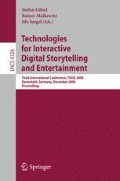Abstract
Interactive Narrative is an approach to interactive entertainment that enables the player to make decisions that directly affect the direction and/or outcome of the narrative experience being delivered by the computer system. Interactive narrative requires two seemingly conflicting requirements: coherent narrative and user agency. We present an interactive narrative system that uses a combination of narrative control and autonomous believable character agents to augment a story world simulation in which the user has a high degree of agency with narrative plot control. A drama manager called the Automated Story Director gives plot-based guidance to believable agents. The believable agents are endowed with the autonomy necessary to carry out directives in the most believable fashion possible. Agents also handle interaction with the user. When the user performs actions that change the world in such a way that the Automated Story Director can no longer drive the intended narrative forward, it is able to adapt the plot to incorporate the user’s changes and still achieve dramatic goals.
Access this chapter
Tax calculation will be finalised at checkout
Purchases are for personal use only
Preview
Unable to display preview. Download preview PDF.
References
Aylet, R.: Emergent narrative, social immersion and storification. In: Proc. of the 1st International Workshop on Narrative and Interactive Learning Environments (2000)
Bates, J.: Virtual Reality, Art, and Entertainment. Presence: The Journal of Tele-operators and Virtual Environments 1 (1992)
Cavazza, M., Charles, F., Mead, S.: Planning Characters’ Behaviour in Interactive Storytelling. Journal of Visualization and Computer Animation 13, 121–131 (2002)
Kelso, M., Weyhrauch, P., Bates, J.: Dramatic Presence. Presence: The Journal of Teleoperators and Virtual Environments 2 (2005)
Louchart, S., Aylett, R., Dias, J., Paiva, A.: Unscripted narrative for affectively driven characters. In: Proc. of the 1st National Conf. on Artificial Intelligence and Interactive Digital Entertainment (2005)
Loyall, A.B.: Believable Agents: Building Interactive Personalities. Ph.D. Dissertation, Carnegie Mellon University (1997)
Magerko, B.: Story Representation and Interactive Drama. In: Proc. of the 1st Conf. on Artificial Intelligence and Interactive Digital Entertainment (2005)
Marsella, S., Johnson, W.L., LaBore, K.: Interactive Pedagogical Drama. In: Proc. of the 4th Int. Conf. on Autonomous Agents (2000)
Mateas, M., Stern, A.: Towards Integrating Plot and Character for Interactive Drama. AAAI Spring Symposium on Social Intelligent Agents: The Human in the Loop (2000)
Mateas, M., Stern, A.: Architecture, Authorial Idioms and Early Observations of the Interactive Drama Façade (Technical Report CMU-CS-02-198). School of Computer Science, Carnegie Mellon University (2002)
Mateas, M., Stern, A.: A Behavior Language: Joint Action and Behavior Idioms. In: Prendinger, H., Ishizuka, M. (eds.) Life-like Characters: Tools, Affective Functions and Applications, Springer, Heidelberg (2004)
Mott, B.W., Lester, J.C.: U-Director: A Decision-Theoretic Narrative Planning Architecture for Storytelling Environments. In: Proc. of the 5th Int. Joint Conf. on Autonomous Agents and Multi Agent Systems (2006)
Riedl, M.O.: Towards Integrating AI Story Controllers and Game Engines: Reconciling World State Representations. In: Proc. of the IJCAI Workshop on Reasoning, Representation and Learning in Computer Games (2005)
Riedl, M.O., Saretto, C.J., Young, R.M.: Managing Interaction Between Users and Agents in a Multi-Agent Storytelling Environment. In: Proc. of the 2nd Int. Conf. on Autonomous Agents and Multi Agent Systems (2003)
Sengers, P.: Schizophrenia and Narrative in Artificial Agents. In: Mateas, M., Sengers, P. (eds.) Narrative Intelligence, John Benjamins, Amsterdam (2003)
Si, M., Marsella, S., Pynadath, D.V.: Thespian: Using multi-agent fitting to craft interactive drama. In: Proc. of the 4th Int. Joint Conf. on Autonomous Agents and Multi Agent Systems (2005)
Szilas, N.: IDtension: a narrative engine for interactive drama. In: Proc. of the 1st Int. Conf. on Technologies for Interactive Digital Storytelling and Entertainment (2003)
Tambe, M.: Towards Flexible Teamwork. Journal of Artificial Intelligence Research 7 (2003)
Weld, D.: An Introduction to Least Commitment Planning. AI Magazine 15 (1994)
Weyhrauch, P.: Guiding Interactive Fiction. Ph.D. Dissertation, School of Computer Science, Carnegie Mellon University (1997)
Young, R.M., Riedl, M.O., Branly, M., Jhala, A., Martin, R.J., Saretto, C.J.: An Architecture for Integrating Plan-Based Behavior Generation with Interactive Game Environments. Journal of Game Development 1, 51–70 (2004)
Author information
Authors and Affiliations
Editor information
Editors and Affiliations
Rights and permissions
Copyright information
© 2006 Springer-Verlag Berlin Heidelberg
About this paper
Cite this paper
Riedl, M.O., Stern, A. (2006). Believable Agents and Intelligent Story Adaptation for Interactive Storytelling. In: Göbel, S., Malkewitz, R., Iurgel, I. (eds) Technologies for Interactive Digital Storytelling and Entertainment. TIDSE 2006. Lecture Notes in Computer Science, vol 4326. Springer, Berlin, Heidelberg. https://doi.org/10.1007/11944577_1
Download citation
DOI: https://doi.org/10.1007/11944577_1
Publisher Name: Springer, Berlin, Heidelberg
Print ISBN: 978-3-540-49934-3
Online ISBN: 978-3-540-49935-0
eBook Packages: Computer ScienceComputer Science (R0)

